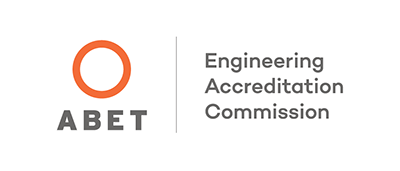- Undergraduate Education
- Curriculum by Semester
- Technical Electives
- Freshman Course Placement
- Accreditation
- Certificates
- Global Engineering Leadership Minor
- Accelerated Program (B.S./M.S. Dual Degree)
- Admissions
- Online Application
- University Admissions Information
- Tuition, Fees, and Expenses
- Transfer Education
- Co-ops and Internships
- Honor Code
- Petitions, Requests, and Appeals
- Bagley College of Engineering Computer Requirements
- Home |
- Accreditation
Accreditation
The B.S. program in Mechanical Engineering is accredited by the Engineering Accreditation Commission of ABET, https://www.abet.org, under the General Criteria and Program Criteria for Mechanical and similarly named engineering programs.

Program Mission
The mission of the School of Mechanical Engineering is to educate students in fundamental engineering principles, thus enabling the understanding of existing and next generation technologies relevant to research and engineering practice. All graduates will receive a broad education that will enable them to be successful in industry or academia, the profession, and the community.
Program Educational Objectives
To carry out this mission, the Mechanical Engineering faculty, with input from other constituencies, has established the following objectives that describe the expected accomplishments of graduates during the first few years following graduation:
- Apply fundamental engineering knowledge, hands-on experience, industry perspective, and research skills to become experts or leaders within a chosen engineering career path.
- Exhibit life-long learning and develop personal and teamwork skills in order to effectively solve real-life problems and clearly communicate their results.
- Practice ethical responsibility and accountability in professional activities and actively participate in professional development.
Student Outcomes
Program educational objectives are supported by student outcomes. The student outcomes for the Bachelor of Science in Mechanical Engineering program at Mississippi State University are listed below.
1. An ability to identify, formulate, and solve complex engineering problems by applying principles of engineering, science, and mathematics
2. An ability to apply engineering design to produce solutions that meet specified needs with consideration of public health, safety, and welfare, as well as global, cultural, social, environmental, and economic factors
3. An ability to communicate effectively with a range of audiences
4. An ability to recognize ethical and professional responsibilities in engineering situations and make informed judgments, which must consider the impact of engineering solutions in global, economic, environmental, and societal contexts
5. An ability to function effectively on a team whose members together provide leadership, create a collaborative and inclusive environment, establish goals, plan tasks, and meet objectives
6. An ability to develop and conduct appropriate experimentation, analyze and interpret data, and use engineering judgment to draw conclusions
7. An ability to acquire and apply new knowledge as needed, using appropriate learning strategies
Bachelor of Science Enrollment and Graduation Data
| Academic Year | Undergraduate Students | BS Degrees Awarded |
|---|---|---|
| 2022-2023 | 788 | 193 |
| 2021-2022 | 818 | 164 |
| 2020-2021 | 838 | 190 |
| 2019-2020 | 831 | 192 |
| 2018-2019 | 831 | 179 |
